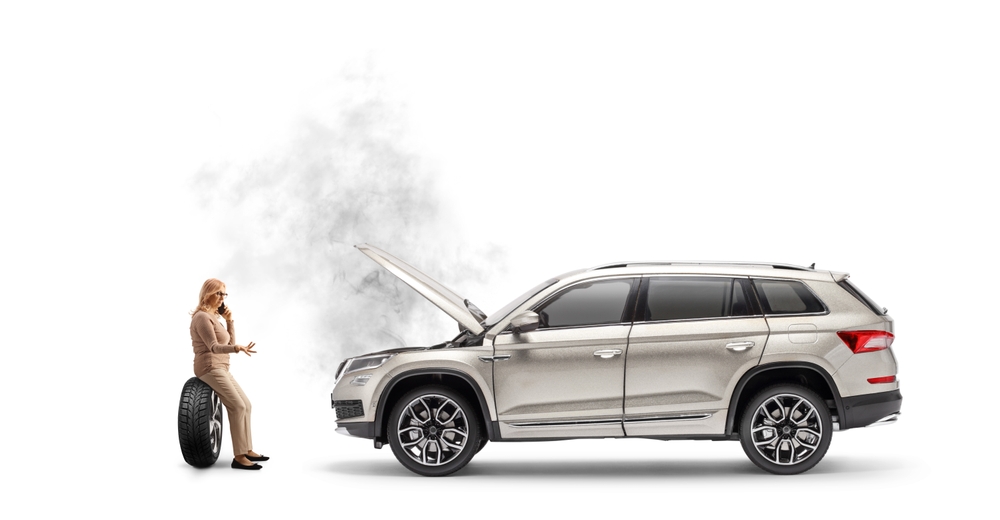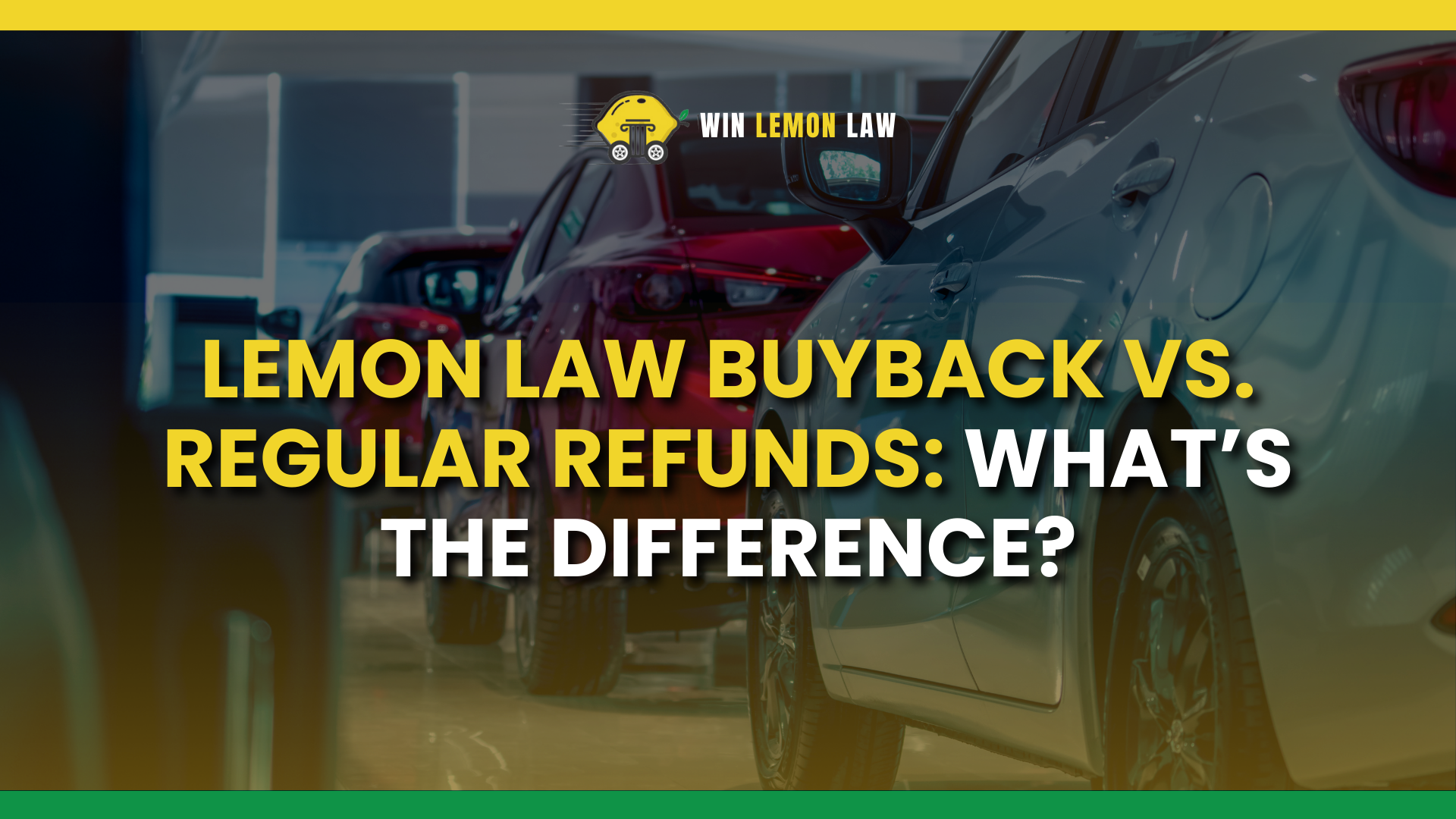Every year, countless consumers purchase or lease new vehicles, expecting reliability, safety, and quality. However, some cars roll off the assembly line with serious defects, leaving their owners frustrated and financially burdened. If you find yourself dealing with a defective vehicle—commonly known as a lemon—you may be entitled to compensation under California’s Lemon Law. The financial and emotional toll of owning a lemon can be overwhelming, from constant repairs and safety concerns to unexpected expenses and lost time. Many consumers feel trapped, unsure of their rights or the best course of action.
Lemon Law protections exist to ensure that consumers are not left with an unsafe or unreliable vehicle. However, not all forms of compensation are the same. Vehicle owners facing persistent mechanical issues typically have two options for financial recovery: a manufacturer buyback under Lemon Law or a regular refund. While both can provide relief, they differ significantly in terms of coverage, legal backing, and overall financial impact. Choosing the right option can mean the difference between receiving full reimbursement and being left with partial compensation that does not cover your losses.
Understanding these differences is crucial when deciding how to proceed with your claim. Below, we examine each option in detail and explain how you can ensure the best possible outcome if your vehicle qualifies under Lemon Law.
What Is a Lemon Law Buyback?

A Lemon Law buyback occurs when the vehicle manufacturer repurchases a car that has been legally deemed a lemon. This means the car has met the required legal standards for being defective beyond repair, making the manufacturer responsible for compensating the owner.
A Lemon Law buyback generally includes:
- The full purchase price of the vehicle
- Sales tax, registration fees, and financing charges
- Incidental expenses, such as towing and rental car costs
Manufacturers are allowed to deduct a reasonable usage fee, which accounts for the miles driven before the defect was first reported. In California, this deduction is calculated using a specific formula:
Usage Fee = (Miles Driven Before First Repair Attempt / 120,000) x Purchase Price of the Vehicle
It is important to ensure that this calculation is accurate. Manufacturers sometimes attempt to reduce the buyback amount unfairly, making it essential to seek guidance from a Lemon Law attorney who can verify the compensation you are owed.
How Does the Buyback Process Work?
The Lemon Law buyback process typically follows several key steps:
- Identify and Document the Defect – The defect must be reported within the vehicle’s original warranty period. Keep detailed records of repair attempts, invoices, and correspondence with the manufacturer.
- Multiple Repair Attempts – The manufacturer must have had a reasonable number of attempts to repair the defect. In California, this generally means at least two repair attempts for a serious safety issue or four attempts for a general defect.
- Out-of-Service Requirement – If the vehicle has been out of service for 30 days or more due to repair-related issues, it may qualify for a buyback.
- Filing a Lemon Law Claim – If your vehicle meets the necessary criteria, you can file a claim with the manufacturer. This often requires submitting documentation and a formal request for a buyback.
- Manufacturer’s Response – The manufacturer will review your claim and either approve or deny the buyback request. If denied, legal action may be necessary to enforce your rights under Lemon Law.
- Receiving Compensation – If approved, the manufacturer will issue compensation, which typically includes the original purchase price, taxes, fees, and incidental expenses.
Common Manufacturer Tactics to Lookout For
While Lemon Law buybacks are designed to protect consumers, manufacturers often attempt to minimize their financial liability. Some common tactics include:
- Delaying the claim process – Manufacturers may take excessive time to review your case in the hope that you will give up.
- Offering partial compensation – Some manufacturers may attempt to lowball the refund amount or improperly deduct excessive usage fees.
- Arguing that the defect is not substantial – They may claim that the defect does not significantly impact the vehicle’s use, safety, or value.
- Suggesting unnecessary additional repairs – Some manufacturers try to convince consumers to keep returning for repairs rather than approving a buyback.
Working with a qualified Lemon Law attorney can help you navigate these challenges and ensure that you receive the compensation you deserve.
What Is a Regular Refund?
A regular refund is an informal settlement option that manufacturers or dealers may offer as a goodwill gesture. Unlike a Lemon Law buyback, a regular refund does not carry the same legal protections and may not fully cover your financial losses.
A regular refund may include:
- The adjusted purchase price based on depreciation
- Sales tax and registration fees
However, this type of refund may not cover costs such as rental car fees, towing expenses, or legal fees. Additionally, if the vehicle was financed, the refund may not fully cover the remaining loan balance, potentially leaving the owner responsible for paying off the difference.
Manufacturers often prefer offering regular refunds because they involve fewer legal obligations and lower costs. While accepting a quick payout might seem tempting, it is important to understand whether you are receiving fair compensation before agreeing to any settlement.
Lemon Law Buyback vs. Regular Refunds: Key Differences

Now that we’ve covered the basics, let’s examine the major differences between these two options.
Who Initiates the Process?
- Lemon Law Buyback: The consumer has the right to request a buyback, and the manufacturer must comply if the vehicle meets legal criteria.
- Regular Refund: The dealer or manufacturer offers the refund voluntarily, often requiring negotiation, with no guarantee of full reimbursement.
What’s Covered?
- Lemon Law Buyback: Includes the full purchase price, incidental expenses, loan payoff, and legal fees.
- Regular Refund: Typically limited to the depreciated purchase price and some taxes, leaving the consumer responsible for additional costs.
Legal Backing
- Lemon Law Buyback: Protected under state Lemon Law statutes, allowing consumers to enforce their rights.
- Regular Refund: No legal obligation exists for manufacturers to offer this refund, making it a less reliable option for consumers.
What About Replacement Vehicles?
Instead of a buyback or refund, manufacturers may offer a replacement vehicle. Whether this is beneficial depends on how the replacement is structured.

Lemon Law Replacement Under lemon law, you may receive a replacement vehicle of similar value, make, and features. The manufacturer must also cover related costs such as taxes, registration, and any other fees.
Regular Trade-In Some dealerships may suggest trading in your defective vehicle for another model from their inventory. However, this is not the same as a lemon law replacement. Dealers may try to push you toward a more expensive car or offer unfair financing terms, so be sure to compare trade-in values before agreeing to any deal.
Is a Replacement the Right Choice? A replacement may work if you trust the manufacturer and want to continue driving one of their vehicles. However, ensure the replacement vehicle is of equal value and that you are not subjected to hidden costs.
How Do You Qualify for a Lemon Law Buyback in California?
In California, a vehicle may qualify for a lemon law buyback if it has a significant defect that affects its use, safety, or value and cannot be repaired after a reasonable number of attempts. To be eligible, the following conditions generally must be met:
- The defect was reported within the original manufacturer’s warranty period.
- The defect remains unresolved despite multiple repair attempts.
- The car has undergone at least two repair attempts for a serious safety issue or four repair attempts for a general defect.
- The vehicle has been out of service for at least 30 days due to repairs.
If your vehicle does not meet these criteria, a regular refund may be the only option available.
How to Start a Lemon Law Buyback Claim
If you believe your vehicle qualifies for a California lemon law buyback, follow these steps to strengthen your case.
1. Gather Documentation Your claim is only as strong as the evidence you provide. Collect all repair invoices, receipts, and records of communication with the manufacturer. These documents should include:
- Repair dates
- Descriptions of the defect
- Whether the problem was resolved
Additionally, keep a copy of your purchase agreement and warranty information.
2. Request Reimbursement or Replacement Before taking legal action, reach out to the manufacturer or dealer and explain the issue. In some cases, they may offer to settle voluntarily. However, be cautious and ensure that any offer fully compensates you.
3. Contact a Lemon Law Expert Handling a lemon law claim on your own can be time-consuming and difficult, especially if the manufacturer resists. A knowledgeable lemon law attorney can manage your case, file paperwork, and negotiate on your behalf to secure the best possible outcome.
4. Be Prepared for Manufacturer Tactics Manufacturers may attempt to delay your claim, offer low settlements, or dispute the validity of your case. Having legal representation ensures you are not taken advantage of and that you receive the full compensation you are entitled to under the law.
Closing
If you are struggling with a defective vehicle, Win Lemon Law is here to help. Our experienced team specializes in handling Lemon Law claims and will fight to ensure that you receive the full compensation you deserve. Whether you need a buyback, refund, or replacement, we are committed to protecting your rights and guiding you through every step of the legal process.
Contact Win Lemon Law today for a FREE consultation and take the first step toward resolving your Lemon Law claim.

